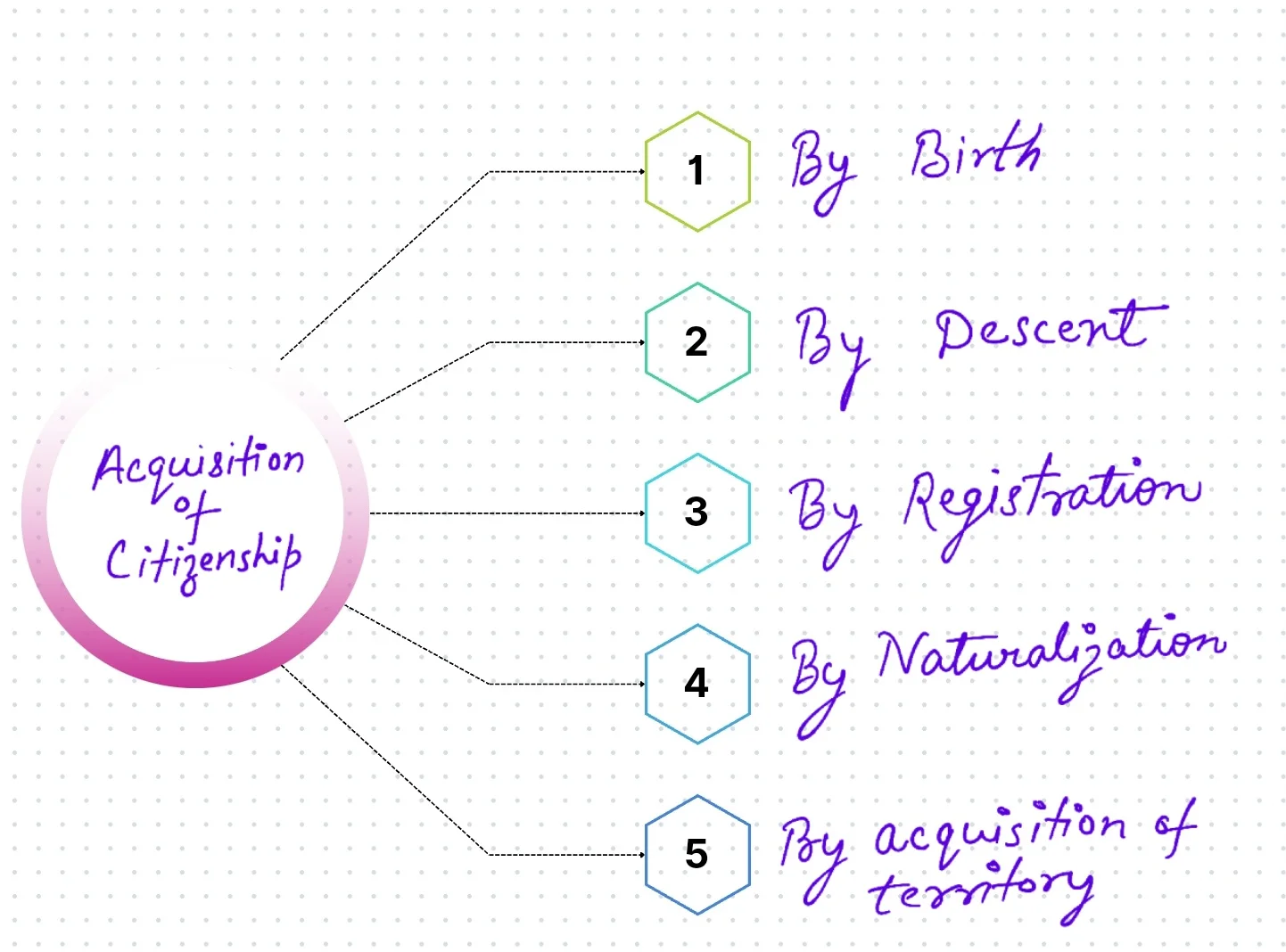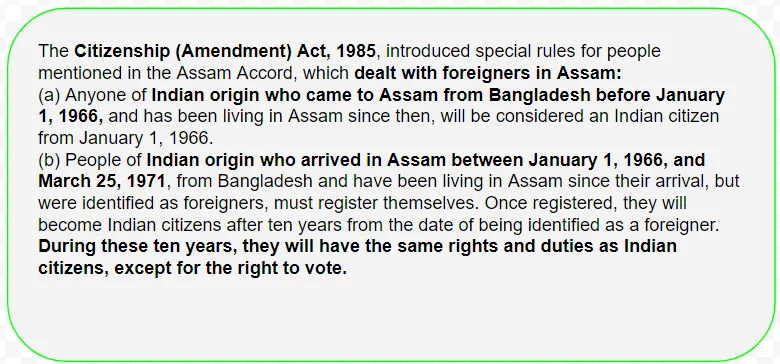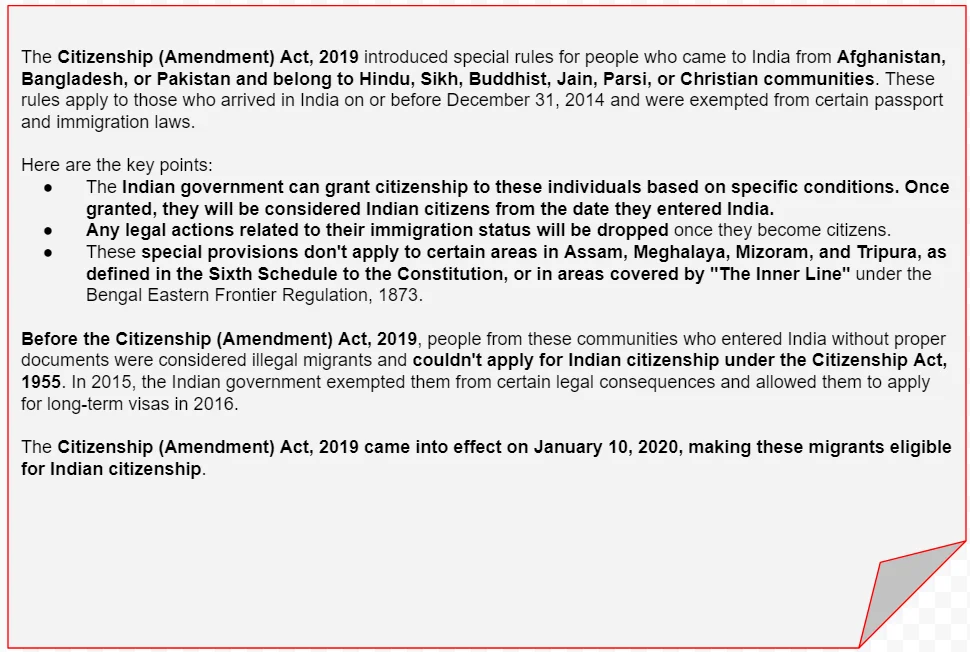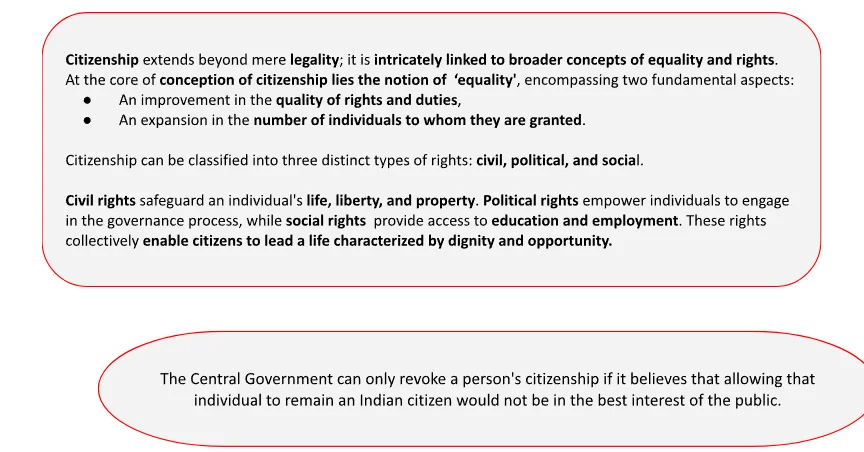Citizenship defines a person’s legal relationship with a state, granting them specific rights and duties. In India, the Citizenship Act of 1955 outlines how individuals can acquire or lose Indian citizenship. The act distinguishes between citizenship by birth, descent, registration, and naturalization. It also addresses the impact of territorial changes on citizenship.
Overview of the Citizenship Act, 1955 and the Citizenship Amendment Act, 2019
Citizenship Act of 1955
- Overview: The Citizenship Act of 1955 tells us how you can become a citizen of India or lose Indian citizenship after the Constitution started.
- Originally, this law also talked about Commonwealth Citizenship, but that part was taken out by the Citizenship (Amendment) Act of 2003.

Enroll now for UPSC Online Course
-
Citizenship by Birth (Section 3)
-
- A person born in India has different rules for citizenship based on when they were born:
- 1950 – July 1, 1987: If they were born between January 26, 1950, and before July 1, 1987, they are automatically Indian citizens, regardless of their parents’ nationality.
- July 1, 1987 – December 3, 2004: If they were born on or after July 1, 1987, but before December 3, 2004, they are Indian citizens by birth if at least one of their parents is an Indian citizen when they were born.
- From December 3, 2004: If they were born on or after December 3, 2004, they are Indian citizens by birth if:
- Both of their parents are Indian citizens, or
- One of their parents is an Indian citizen, and the other is not an illegal immigrant at the time of their birth.
- A person born in India has different rules for citizenship based on when they were born:
There are some exceptions:
|
-
Citizenship by Descent (Section 4)
-
- A person born outside India can become an Indian citizen through descent under these conditions:
- Born January 26, 1950 – December 10, 1992: If they were born between January 26, 1950, and before December 10, 1992, and if his father was an Indian citizen by birth at time of his birth.
- Born December 10, 1992 – December 3, 2004: If they were born on or after December 10, 1992, but before December 3, 2004, and either of his parents was an Indian citizen by birth at time of his birth.
- From December 3, 2004: If they were born on or after December 3, 2004, they can become an Indian citizen if their birth is registered at an Indian Consulate within one year of their birth, or with the permission of the Central Government after that period.
- Additionally, their parents need to register their birth and confirm in writing that the child doesn’t have a passport from another country.
- A person born outside India can become an Indian citizen through descent under these conditions:
-
Citizenship by Registration (Section 5)
-
- Eligibility Criteria: Indian Citizenship can be acquired through registration (not for an illegal migrant).
- For this, a person shall be deemed to be a “Person of Indian Origin” if he, or either of his parents, were born in undivided India or in such other territory which became part of India after 15th day of August 1947.
- Conditions for Persons of Indian Origin: To acquire citizenship by registration, a person should fulfill the following conditions–
- Residency Requirement: Persons of Indian origin should be ordinarily resident in India for SEVEN YEARS before making an application under this section. (Throughout the period of twelve months immediately before making application and for SIX YEARS in the aggregate in the EIGHT YEARS preceding the twelve months).
- Residing Outside India: Persons of Indian origin who are ordinarily resident in any country or place outside undivided India.
- Spouses of Indian Citizens: Persons who are married to a citizen of India and who are ordinarily resident in India for SEVEN YEARS before making an application.
- Minor Children: Minor children whose both parents are Indian citizens.
- Overseas Citizen of India Cardholders: A person of full age and capacity who has been registered as an Overseas Citizen of India Cardholder for five years, and who is ordinarily resident in India for twelve months before making an application for registration
- Eligibility Criteria: Indian Citizenship can be acquired through registration (not for an illegal migrant).
|
| All the above categories of persons must take an oath of allegiance before they are registered as citizens of India. |
- Citizenship by Naturalisation (Section 6)
- Foreigners (who are not illegal migrants) can become Indian citizens by naturalisation under certain conditions. These conditions include:
- Continuous Residency: Living in India continuously for twelve years, with the last year just before applying and a total of eleven years within the previous fourteen years.
- Citizenship Restrictions: Not being a citizen of a country that doesn’t allow Indian citizens to become citizens by naturalization.
- Renunciation of Foreign Citizenship: Being willing to give up the citizenship of any other country if application for Indian citizenship is accepted.
- Having a good character.
- Knowledge of Eighth Schedule Languages: Knowing one of the languages listed in the Eighth Schedule of the Indian Constitution.
- Intent to Reside or Work: Planning to live in India, work for the Indian government, or work for an international organization that India is a part of.
- Foreigners (who are not illegal migrants) can become Indian citizens by naturalisation under certain conditions. These conditions include:
|
|
All the above categories of persons must take an oath of allegiance before they are registered as citizens of India. |
-
Citizenship by Incorporation of Territory (section 7)
-
- Granting Citizenship: When a foreign land becomes a part of India, the Indian government can decide who becomes an Indian citizen from that place.
- They will announce it in the Official Gazette, and those people will officially become Indian citizens from the date mentioned in the announcement.
- Example: For instance, when Pondicherry became a part of India, the people of Pondicherry became Indian citizens through the Citizenship (Pondicherry) Order, 1962, which was made under the Citizenship Act, 1955.
- Granting Citizenship: When a foreign land becomes a part of India, the Indian government can decide who becomes an Indian citizen from that place.

| Ignite your Mind:
While we recognize the differences between the rights and freedoms enjoyed by citizens and non-citizens, the existence of stateless individuals raises profound ethical and political questions. What are the challenges faced by those who belong to no country, and how can the concept of Global Citizenship offer a path towards a more inclusive and equitable world where basic rights and freedoms transcend national borders? |
Citizenship Amendment Act of 2019
Citizenship Amendment Act of 2019 aims to make amendments to the Citizenship Act of 1955.
- Background: The Citizenship (Amendment) Act of 2003 established that ‘illegal migrants‘ could not apply for citizenship through registration or naturalization. However, in recognition of the challenges faced by minorities in certain neighboring countries, some concessions have been made, including:

- Regulations Under the Foreigners Act of 1946: The Foreigners Act of 1946, regulates the entry and departure of foreigners in India, and the Passport (Entry into India) Act of 1920 mandates foreigners to carry a passport and empowers the Central Government to detain or deport illegal migrants.
- Exemptions for Specific Migrant Groups: In 2015 and 2016, the central government issued notifications exempting specific groups of illegal migrants from the provisions of the 1946 and 1920 Acts.
- These groups include Hindus, Sikhs, Buddhists, Jains, Parsis, and Christians from Afghanistan, Bangladesh, and Pakistan, who arrived in India on or before December 31, 2014.
Arguments in Favor of the Amendment Act
- Religious Persecution: The Nehru-Liaquat Pact, signed in 1950, aimed to provide safeguards and rights to religious minorities, including the non-recognition of forced conversions and the return of abducted women and looted property.
- However, Afghanistan, Pakistan, and Bangladesh have state religions with discriminatory blasphemy laws, religious violence, and forced conversions, resulting in religious persecution of minority groups.
- Example: The non-Muslim minority population in Bangladesh declined from 23.20% in 1951 to approximately 9.6% in 2011.
- Addressing Illegal Immigration: Illegal immigration from neighboring countries has been a contentious issue for decades.
- In Assam, a six-year-long agitation that began in 1979 demanded the identification and deportation of all illegal foreigners, primarily Bangladeshi immigrants.
- This act aims to differentiate between illegal immigrants and persecuted communities seeking refuge.

Argument Against Amendment Act
- The Citizenship (Amendment) Act, 2019 (CAA) has been criticized for its religious-centric approach:
- Constitutional violation : Protesters claim the law violates the Constitution as it aims to grant Indian citizenship on the basis of religion.
- Targeting Muslims : The fundamental criticism of the act has been that it specifically targets Muslims.
Enroll now for UPSC Online Course
-
- Non-Muslims :There are concerns that the amendment provides a “shield” to the non-Muslims, who can claim that they were migrants who fled persecution from Afghanistan, Pakistan, or Bangladesh, while the Muslims do not have such a benefit.
| Must Read | |
| Current Affairs | Editorial Analysis |
| Upsc Notes | Upsc Blogs |
| NCERT Notes | Free Main Answer Writing |
Conclusion
The Citizenship Amendment Act of 2019 modifies the 1955 Act by providing easier citizenship for certain persecuted minorities from neighboring countries, though it has sparked controversy for its perceived religious bias.
- This amendment highlights ongoing debates about the balance between national security and humanitarian considerations in citizenship laws.
Sign up for the PWOnlyIAS Online Course by Physics Wallah and start your journey to IAS success today!
| Related Articles | |
| What is the Indian Independence Act 1947? Comprehensive Guide | CAA 2024 Rules: Citizenship Amendment Rules |
| Features of Indian Constitution | CITIZENSHIP |

 GS Foundation
GS Foundation Optional Course
Optional Course Combo Courses
Combo Courses Degree Program
Degree Program









